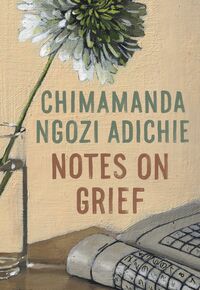Take a photo of a barcode or cover
Clear, palpable meditation on grief, so beautifully written and heartbreaking.
emotional
reflective
sad
Graphic: Grief, Death of parent
Un bien bel hommage à son père mais un récit un peu trop court pour moi.
emotional
reflective
sad
medium-paced
emotional
reflective
sad
fast-paced
“Grief is a cruel kind of education.” Everyone experiences the loss of a loved one at some point in their lives, but grief is such unique experience. As Adiche wrote about losing her father it made me reflect on the death of my own parent. What a beautiful exploration on grief and remembering the life of someone who is no longer with us.
dark
emotional
inspiring
reflective
sad
fast-paced
"(...) those who could feel real grief were lucky to have loved." a short, gut-wrenching read about the author losing her dad. it felt like i was part of her family for a bit. beautiful & touching.
Adichie's name and my general inexperience with grief drew me to this book, but it was the vulnerability and specificity of her experiences that she willingly shared with us that kept me captivated. The idea of writing an entire book about one experience or person confounded me, but as I kept reading, I realized the depth of the story. The ability of the short chapters to provide brief and heartfelt glimpses into her late father, and as always, reading allows me to experience things through the writer's craft - this being no exception. As someone with elderly parents, the thought of a future where I'll be grieving their permanent absence paralyzes me, but Adichie shows that shared memories with loved ones and writing can act as means to heal. There is so much power in her vulnerability, and it gives me hope. Adichie captured my respect and intrigue with her acclaimed Ted Talk on "The Danger of a Single Story" and has only enflamed my desire to know more. I guess this is a roundabout way of saying Thank you Chimamanda Ngozi Adichie for all you do.
Some memorable quotes:
"How is it that the world keeps going, breathing in and out unchanged, while in my soul there is a permanent scattering (12)?"
"I cannot think too much, I dare not think too deeply, or else I will be defeated, not merely by pain but by a drowning nihilism, a cycle of thinking there's no point to anything (13)."
"'It has happened, so just celebrate his life,' an old friend wrote, and it incensed me. How facile to preach about the permanence of death, when it is, in fact, the very permanence of death that is the source of anguish...What does not feel like a deliberate prodding of wounds is a simple 'I'm sorry' because in its banality it presumes nothing. Ndo, in Igbo, comforts more, a word that is 'sorry' with a metaphysical heft, a word with borders wider than mere 'sorry.' Concrete and sincere memories from those who knew him comfort the most (22-23)."
"Grief was the celebration of love, those who could feel real grief were lucky to have loved (50-51)."
"I finally understand why people get tatttoos of those they have lost. The need to proclaim not merely the loss but the love, the continuity. I am my father's daughter. It is an act of resistance and refusal: grief telling you it is over and your heart saying it is not; grief trying to shrink your love to the past and your heart saying it is present (66)."
"I am writing about my father in the past tense, and I cannot believe I am writing about my father in the past tense (67)."
Some memorable quotes:
"How is it that the world keeps going, breathing in and out unchanged, while in my soul there is a permanent scattering (12)?"
"I cannot think too much, I dare not think too deeply, or else I will be defeated, not merely by pain but by a drowning nihilism, a cycle of thinking there's no point to anything (13)."
"'It has happened, so just celebrate his life,' an old friend wrote, and it incensed me. How facile to preach about the permanence of death, when it is, in fact, the very permanence of death that is the source of anguish...What does not feel like a deliberate prodding of wounds is a simple 'I'm sorry' because in its banality it presumes nothing. Ndo, in Igbo, comforts more, a word that is 'sorry' with a metaphysical heft, a word with borders wider than mere 'sorry.' Concrete and sincere memories from those who knew him comfort the most (22-23)."
"Grief was the celebration of love, those who could feel real grief were lucky to have loved (50-51)."
"I finally understand why people get tatttoos of those they have lost. The need to proclaim not merely the loss but the love, the continuity. I am my father's daughter. It is an act of resistance and refusal: grief telling you it is over and your heart saying it is not; grief trying to shrink your love to the past and your heart saying it is present (66)."
"I am writing about my father in the past tense, and I cannot believe I am writing about my father in the past tense (67)."
emotional
reflective
sad
medium-paced
emotional
reflective
sad
medium-paced
Moderate: Death, Grief, Death of parent
Minor: Slavery, Violence, Kidnapping, War, Pandemic/Epidemic
Follow me on Instagram: www.instagram.com/thisotherbookaccount
Love lures us into the false belief that grief is a thing that happens to other people. So we stow it in a closet, we put it away. We tell ourselves that we will cross the bridge when we get there, wherever — whenever — ‘there’ is. That is why, when grief hits, when it climbs out of the closet to announce itself, we lose our composures. We fall apart. There are no guidebooks through this forest. We are on our own now.
These are just some of the things that Chimamanda Ngozi Adichie must have experienced when her father passed away in 2020 halfway across the world. Stuck in the US due to the pandemic, Adichie wrote this essay as a way to deal with the loss of her father. It’s raw, it’s unadulterated and it lays bare the crude emotions that assault those in bereavement. Similar to CS Lewis’ A Grief Observed, Adichie painstakingly — and you can feel every stab in every word — documents the first days/weeks of her grief, the way it ebbed and flowed, the way it gave relief in retreat, the way it crushed and pillaged upon its return.
Several passages spoke to me as the child of living parents. The false belief that your loved ones will be there for years yet; the want — no, the need — to absorb every story before even it loses its protagonist and first-person narrative; the strange sense of relief, once it happens, that yes, this is it, nothing can be worse than this. It gets better from here. It must.
The fact that I recently came close to losing a family member made this essay a truly poignant one. I only wished that, when grief emerges from the closet in my mind — in all of our minds, in fact — that I will have the same fortitude to mould it, to turn it into words, so that it will no longer have power over me.
Yet, doubt remains. Will I? Will it happen that way? I guess I will cross the bridge when I get there, wherever — whenever — ‘there’ is.
Love lures us into the false belief that grief is a thing that happens to other people. So we stow it in a closet, we put it away. We tell ourselves that we will cross the bridge when we get there, wherever — whenever — ‘there’ is. That is why, when grief hits, when it climbs out of the closet to announce itself, we lose our composures. We fall apart. There are no guidebooks through this forest. We are on our own now.
These are just some of the things that Chimamanda Ngozi Adichie must have experienced when her father passed away in 2020 halfway across the world. Stuck in the US due to the pandemic, Adichie wrote this essay as a way to deal with the loss of her father. It’s raw, it’s unadulterated and it lays bare the crude emotions that assault those in bereavement. Similar to CS Lewis’ A Grief Observed, Adichie painstakingly — and you can feel every stab in every word — documents the first days/weeks of her grief, the way it ebbed and flowed, the way it gave relief in retreat, the way it crushed and pillaged upon its return.
Several passages spoke to me as the child of living parents. The false belief that your loved ones will be there for years yet; the want — no, the need — to absorb every story before even it loses its protagonist and first-person narrative; the strange sense of relief, once it happens, that yes, this is it, nothing can be worse than this. It gets better from here. It must.
The fact that I recently came close to losing a family member made this essay a truly poignant one. I only wished that, when grief emerges from the closet in my mind — in all of our minds, in fact — that I will have the same fortitude to mould it, to turn it into words, so that it will no longer have power over me.
Yet, doubt remains. Will I? Will it happen that way? I guess I will cross the bridge when I get there, wherever — whenever — ‘there’ is.






